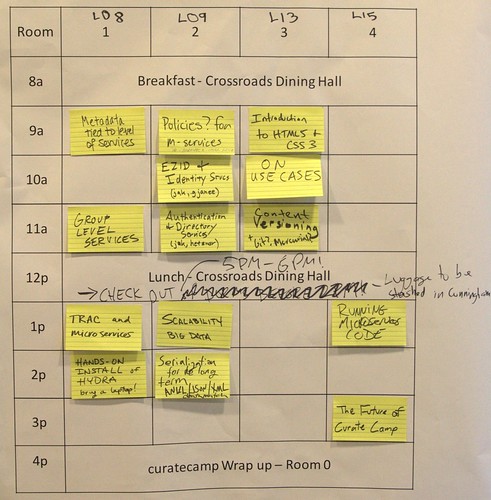About
- What is CURATEcamp?
- CURATEcamp is a series of unconference-style events focused on connecting practitioners and technologists interested in digital curation.
- What's up with the capital letters?
- There was a time when CURATEcamp was a semi-initialism for CURAtion TEchnology camp.
- Who owns/runs CURATEcamp?
- You do! At least, you could. No one owns CURATEcamp. Anyone may run a CURATEcamp, and those who've run past CURATEcamps will gladly share what they've learned about what works and what doesn't.
- Is CURATEcamp right for me?
- One of CURATEcamp's strengths, we feel, is that it brings a broad audience together: librarians and archivists; technologists and curators; library administrators and systems administrators; software developers, users, architects, and designers. Chances are you're interested in the topic of digital curation without even realizing it.
- I heard CURATEcamp is all about the topic of curation microservices...
- The first CURATEcamp event had microservices as a theme, that much is true, and the microservices community has used CURATEcamp as an opportunity to build their community. The camp series is broader than the topic of microservices.
- But I'm in a Fedora/DSpace/(insert software package here) shop...
- Great, you should come to CURATEcamp! We view digital curation as more than just a system where stuff goes. The digital curation community should be making connections across software implementation choices and CURATEcamp is a vehicle to accomplish that.
- I don't work in libraries or academia...
- While CURATEcamp tends to attract folks from libraries and academia, digital curation is a practice that happens all over: libraries, archives, public media, industry, start-ups, non-profits, government, and so forth. As a former colleague said, "if you're keeping large piles of heterogeneous digital content alive with a >5 year horizon, you're in the same business regardless of your institution's mission."
- What events have been held?
-
- CURATEcamp 2010: Two-day unconference at UC-Berkeley, August 2010
- CURATEcamp IDCC10: One-day OST-style meeting at IDCC10, December 2010
- CURATEcamp Hackfest: One-day hackfest at Code4Lib 2011, February 2011
- CURATEcamp 2011: Two-day unconference at Stanford University, August 2011
- Huh, so you hold your own events and you attach events to related conferences?
- We do! One of the camp's explicit goals is to build community in the area of digital curation and to forge connections across institutional, consortial, project, and software boundaries. Holding one event a year helps, but connecting a series of events together gets folks talking even more. A side effect of attaching to other conferences is we get to reach folks in different locations, and we connect attendees across these conferences.
- Where did CURATEcamp come from?
-
CURATEcamp was inspired by a number of other events, such as Code4Lib, RepoCamp, Open Repositories, International Digital Curation Conference, BarCamp, and THATCamp.
- Why did you need CURATEcamp then?
- Good question. Here's how CURATEcamp differs from related conferences.
- Code4Lib tends not to focus on the digital curation side of the house, focusing instead on other areas within library technology such as software development in support of search and the ILS. We wanted an event very much like Code4Lib in spirit but with 1) a broader focus on digital curation, and 2) an audience with greater diversity in technical savvy.
- RepoCamp was a one-off event primarily concerned with repository interoperability, an important topic for the digital curation community. CURATEcamp is an extension of RepoCamp's aims with (again) a broader focus on digital curation. RepoCamp was an important event, demonstrating the need for this community to continue meeting.
- The Open Repositories conference and CURATEcamp have roughly similar topical boundaries, though OR has traditionally revolved around particular software implementations (DSpace, ePrints, and Fedora). The other difference between OR and CURATEcamp is our informal unconference format, and we have been exploring OR/CURATEcamp partnerships.
- CURATEcamp emphasizes practice over research, unlike IDCC which has traditionally focused on research and policy. CURATEcamp shares a topical focus with IDCC but the camp's format sets it apart; the unconference style brings a more intimate, participatory, and informal feel to the camp. We're interested more in conversation than presentation.
- BarCamp and THATCamp use formats similar to ours. We find THATCamp's success particularly inspiring.
There's enough similarity between the camp and these other events -- particularly Code4Lib, Open Repositories, and IDCC -- to warrant collaborating to serve our collective aims. Despite our differences, we view these events as partners and have benefited from working together.
The idea for CURATEcamp was dreamt up by Declan Fleming and Mike Giarlo at the Thirsty Monk pub in Asheville, North Carolina, during the Code4Lib 2010 conference. We were looking for a combination of RepoCamp, Code4Lib, and Open Repositories. A number of ideas were brainstormed, jotted on cocktail napkins, and percolated up to the digital-curation listserv for comment. The community confirmed there was a gap in the conference space and thus CURATEcamp was born.

